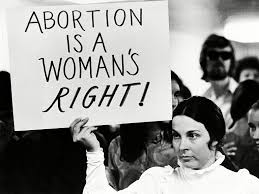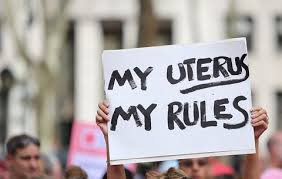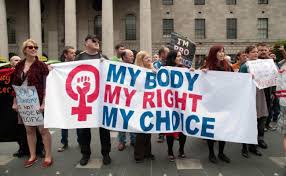Why abortion should be legal: Choice of timing to be a parent

Raising a child is not an easy task & requires social & emotional commitment coupled with financial resources. As such if a person feels they are not ready for a child, it means the pregnancy is unwanted & resultant allowing a fetus to grow into a child is worse than abortion since the resultant child will grow in a non conducive & destructive environment without the care a child needs.
Why abortion should be legal: Morality is subjective

The argument against abortion is a moral argument which is subject to personal interpretation so should not be legislated against. Those see it morally allowable to do abortion should be provided with the means to do so & those who don't believe in abortion should have the choice not to have an abortion. Based on subjectivity, morality is described in a way that is born in the contact of the observer
Why abortion should be legal: Personhood

A fetus is not a human being because personhood begins after a fetus becomes “viable” (able to survive outside the womb) or after birth, not at conception. Embryos and fetuses are not independent, self-determining beings, and abortion is the termination of a pregnancy, not a baby. A person's age is calculated from birth date, not conception, and fetuses are not counted in a Census.
Why abortion should be legal: Criminalizing abortion is not a solution

Prohibiting abortions doesn't stop abortions, women would simply seek abortions via illegal means which are unsafe & illegal, so it is better to provide woman with safe & legal ways to do an abortion. World Health Organization research found that criminalizing abortions drives it underground and makes abortions more dangerous. Unsafe abortions threaten the health of women and girls.
Why abortion should be legal: Reduce maternal deaths

Abortion prevent unwanted & unplanned pregnancies which prevents child neglect since the mother does not want to have children at that moment in time. The World Health Organization estimated that unsafe abortions cause 68,000 maternal deaths worldwide each year, many of those in developing countries where safe and legal abortion services are difficult to access
Why abortion should be legal:Class struggle

Making abortion illegal is also a class struggle since the rich can always go to other places where it is legal & have an abortion whilst the poor cannot do this, but have to resort to unsafe abortions which can lead to their death. No poor person has the resources to visit a country were abortion is legal if it is illegal were they live. So abortion is a class struggle
Why abortion should be legal: Pregnancy is a choice

Making abortion illegal is more or less compulsory pregnancy which contradicts the quest & fight for freedom. When a women discovers she is pregnant, her life will never be the same again no matter what choice she makes about her pregnancy. The choice over when and whether to have children is central to a woman's independence and ability to determine her future. The ability of women to participate equally in the economic and social life of the Nation has been facilitated by their ability to control their reproductive lives.
Why abortion should be legal: Protects womens health

Legal abortions protect women's health. Legal abortion not only protects women's lives, it also protects their health. For tens of thousands of women with heart disease, kidney disease, severe hypertension, sickle-cell anemia and severe diabetes, and other illnesses that can be life-threatening, the availability of legal abortion has helped avert serious medical complications that could have resulted from childbirth. Before legal abortion, such women's choices were limited to dangerous illegal abortion or dangerous childbirth.
Why abortion should be legal: Choice on womens resources

Abortions should be legal because a woman should have the choice on how her resources are used. A fetus cannot survive without resources from the female who should have the right to terminate. If someone needs something donated that you have, you are not legally obligated to donate anything. This parallels to pregnancies because a fetus does need these resources, but the mother is not legally obligated to keep giving this baby her resources. Denying to give someone a body part is not illegal, so terminating a pregnancy should not be illegal
Why abortion should be legal: Bodily Autonomy

Every woman has the right to do whatever they want with their body aka Bodily Autonomy. This is one of the reasons why it is illegal to take organs from the deceased that have not signed off permission. If we continue this right after life, why do we strip it from a pregnant woman? Why would you grant a dead person a right that you wouldn"t give to someone that is alive. Supreme Court Justice Ruth Bader Ginsburg wrote in her dissenting opinion in Gonzales v. Carhart (2007) that undue restrictions on abortion infringe upon "a woman's autonomy to determine her life's course, and thus to enjoy equal citizenship stature.
Why abortion should be legal: Taking away womens rights

Do we have the right to force the mother to keep the baby solely because she consented to participate in these sexual activities? Do we have the right to take away another"s right as we continue to fight for other rights? Why do we take away the rights of a woman because she has the potential to have a baby? Many hard battles have been fought to win political and economic equality for women. These gains will not be worth much if reproductive choice is denied. To be able to choose a safe, legal abortion makes many other options possible. Otherwise an accident or a rape can end a woman's economic and personal freedom.
Why abortion should be legal: Impact of unplanned pregnancy

Many women who choose abortion don't have the financial resources to support a child. 42% of women having abortions are below the federal poverty level. A survey in the peer-reviewed Perspectives on Sexual and Reproductive Health asking women why they had an abortion found that 73% of respondents said they could not afford to have a baby, and 38% said giving birth would interfere with their education and career goals. Motherhood must never be a punishment for having sexual intercourse.An unintended pregnancy can increase tensions, disrupt stability, and push people below the line of economic survival.
Why abortion should be legal: Child deserves to be loved & wanted

A baby should not come into the world unwanted. Having a child is an important decision that requires consideration, preparation, and planning. Unintended pregnancies are associated with birth defects, low birth weight, maternal depression, increased risk of child abuse, lower educational attainment, delayed entry into prenatal care, a high risk of physical violence during pregnancy, and reduced rates of breastfeeding.
Why abortion should be legal: Reduces crime

Teenage girls, unmarried women, and poor women are more likely to have unplanned pregnancies, and resulting children have increased chances of being involved in crime. Around 18 years after abortion was legalized, crime rates began to drop abruptly, and crime rates dropped earlier in states that allowed abortion earlier. women who have abortions are most at risk to give birth to children who would engage in crime
Why abortion should be legal: Reduces female poverty & likelihood of abuse

Women who were turned away from abortion clinics (because they had passed the gestational limit imposed by the clinic) were three times more likely to be below the poverty level two years later than women who were able to obtain abortions. 76% of the "turnaways" ended up on unemployment benefits, compared with 44% of the women who had abortions. Women unable to obtain abortions were more likely to stay in abusive relationships and become